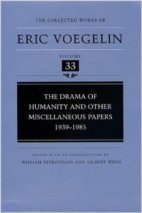The Collected Works: The Drama of Humanity (Volume 33)

The Drama of Humanity and Other Miscellaneous Papers: 1939-1985 (Collected Works of Eric Voegelin, Volume 33). Gilbert Weiss and William Petropulous, eds. Columbia, MO: University of Missouri Press, 2004.
This is a big book, running to 484 pages, including the index. This volume, together with Volume 32, is where the editors put materials that don’t fit anywhere else. Some of the things included here:
1. Conversations with Eric Voegelin from 1967, 1970, and 1975 at the Thomas More Institute in Montreal. It has been circulating all these years in photocopy or photo offset versions. It contains some of Voegelin’s choicest comments, such as his remarks on teaching evolution in the schools:
“You get some funny situations. In California now there is a fight between literalists or providentialists, and biological theorists. And you get in the textbooks both Genesis and Darwinian evolutionism as two “theories” of evolution. You see what that really means? The fundamentalist theologians in California (fundamentalism was well established there at the beginning of the century) don’t know what a myth is. They believe it is a theory. They’re in ignorance.”
“And the biological theorists don’t know that Kant has analysed why one cannot have an immanentist theory of evolution. One can have empirical observation but no general theory of evolution because the sequence of forms is a mystery; it just is there and you cannot explain it by any theory. The world cannot be explained. It is a mythical problem, so you have a strong element of myth in the theory of evolution.”
“So both the theoretical evolutionists and the fundamentalist theologians are illiterate. That level of illiteracy is taught in the text books as “two theories”-neither one of which is a theory.”
The publication of these three conversations was something of an afterthought. There were four conversations originally and the first was published in Volume 11 of the Collected Works as “In Search of the Ground.” One can hope that all four conversations will be reunited in a paperback version in the not-too-distant future-perhaps with some other informal exchanges.
2. Then there is the question and answer period from the Boston College conference from 1983 entitled”The Beginning and the Beyond,” chaired by Frederick Lawrence. It is here that Voegelin makes his comment on the Eucharist:
“Parousia means presence, and you remember this presence by speaking it out: Where the name of Christ is pronounced, there he is present. But you have to be reminded you are in Christ, and pronounce it right. It is quite possible that the formulation of the Eucharist as ‘in my remembrance’ (which is anamnesis) of which Paul speaks always evokes the double-meaning of the remembering of recollection and of remembering in the sense of establishing what the reality is to be.”
3. There there are the exchanges between Voegelin and “father of the atom bomb” J. Robert Oppenheimer at the 1959 Swiss conference directed by Raymond Aron, “Colloques de Rheinfelden.” Also present: Michael Polanyi and Bertrand de Jouvenel. The chapter is entitled “The West and the Meaning of Industrial Society: Excerpts from the Discussion.” What is not clear from these excerpts is that it is pretty much Voegelin “contra mundum” ‘though Aron leans heavily his way. The paper Voegelin delivered at the conference is found in Vol 11 CW under the title “Industrial Society in Search of Reason.”
4. The transcript of Voegelin’s lecture, “Structures of Consciousness,” from the 1978 York University conference is included. The lecture was videotaped and some have seen it in this form.
5. In “Natural Law in Political Theory” (1963) we have exchanges between Voegelin and his Doctor-Father Hans Kelsen. To put it plainly, they disagree more than once.
6. In “Man in Political Institutions” we have Voegelin and a distinguished group of colleagues exchanging views, including Alois Dempf and Jürgen Gebhardt.
7. For the literary-minded there are Voegelin’s notes on T.S. Eliot’s “Four Quartets.”
8. The book concludes with the much-admired “Autobiographical Statement at Age Eighty-two.”
And there is more, but you will have to read the book. It is one of the most inviting of the the Voegelin volumes. A genuine delight.




